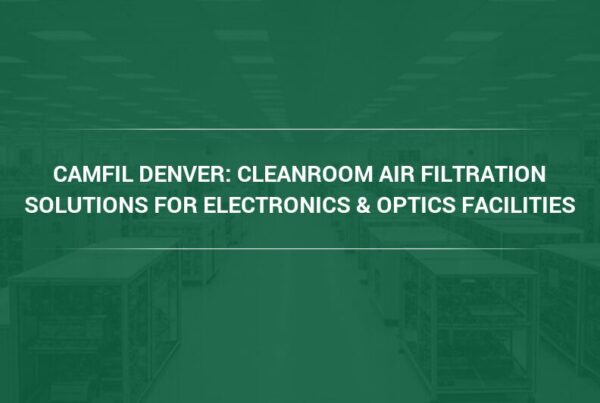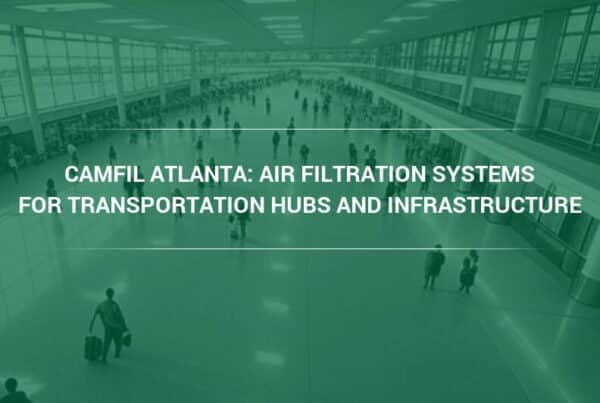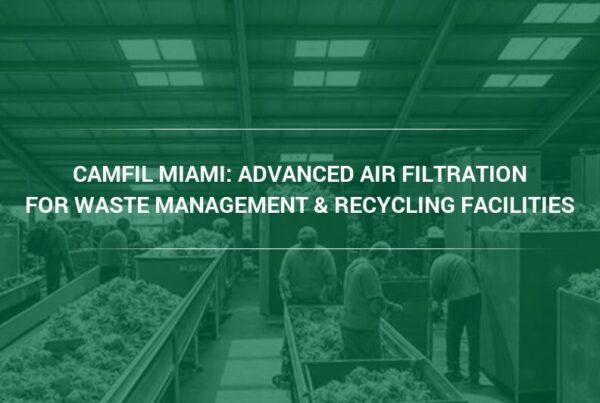Camfil Commercial Air Filter News – Established in 2009 by the United States Environmental Protection Agency (EPA), Indoor airPLUS is a voluntary partnership and labeling program designed to help home builders improve indoor air quality (IAQ) in homes and buildings through stringent construction practices and product specifications that reduce exposure to airborne contaminants and pollutants. The program also supports the installation of reliable HVAC systems with features typically found in commercial air filtration solutions.
“The most important part of indoor air quality is the cleanliness of the air,” said Camfil USA’s Charlie Seyffer, Manager of Marketing & Technical Materials for commercial air filters and 37-year ASHRAE member and active committee participant. “Air contamination consists of particles, gases, and vapors that may reduce the well-being and health of humans and decrease the output and efficiency of production processes.”
The EPA created Indoor airPLUS to meet the growing consumer demand for homes with improved indoor air quality. Building on the foundation set by the agency’s ENERGY STAR requirements for new homes, Indoor airPLUS lists down several construction specifications for home builders, which include the careful selection and installation of:
- Heating, ventilation, and air-conditioning (HVAC) systems
- Moisture control solutions
- Combustion-venting systems
How HVAC Air Filters Maintain Indoor Air Quality
The EPA has repeatedly warned against the dangers of poorly-designed and installed HVAC systems, which can compromise comfort and cause air quality problems. Aside from featuring carefully engineered systems and being compliant with quality installation requirements, Indoor airPLUS homes and buildings also feature:
- Improved HVAC air filters/filtration systems
- Dehumidification systems in warm, moist climates
- Whole-house and isolated ventilation to dilute and completely vent indoor air pollutants
- Regular inspection of air quality control systems and ductwork to ensure cleanliness and adequate airflow
Indoor airPLUS Requirements for HVAC Air Filter Manufacturers
Indoor airPLUS also provides a list of requirements for home builders and HVAC air filter manufacturers.
For starters, all filter access panels on any central forced-air HVAC system are equipped with a gasket material or some other kind of sealing mechanism. Access panels must also fit snugly against the filter’s exposed edge to reduce the likelihood of air bypass.
Indoor airPLUS also recommends these additional HVAC requirements:
- Install HVAC filters that are rated at least MERV 8 (ISO ePM10) or higher according to standards by the American Society of Heating, Refrigeration, and Air Conditioning Engineers (ASHRAE).
- Air filters function best when the filter rack uses a flexible, air-tight gasket material, such as closed-cell foam, on the surface comes into contact with the filter’s downstream side
- The upstream side of the filter, on the other hand, should use friction fit or spring clips to stay securely in place
- Avoid installing any air-cleaning systems that produce ozone
Do Industrial Air Filters Meet Indoor airPLUS’s MERV Requirements?
In short, yes, they do. In fact, the minimum MERV rating for industrial air filters is MERV 8. However, what exactly do these ratings mean?
The American Society of Heating, Refrigeration and Air-Conditioning Engineers (ASHRAE) provides recommendations for the appropriate filter efficiency to ensure the protection of home and building occupants, as well as products and processes, from airborne contaminants and pollutants. So, even if air filter manufacturers build air filtration systems that come with a variety of features and efficiencies, they will at least follow a type of identifiable standard.
Different Commercial Air Filtration Systems According to MERV Rating
When it comes to efficiency, commercial air filtration systems are measured according to their minimum efficiency reporting value (MERV). Each MERV rating is recommended for specific applications, which depends on the size of the space the air filter will be used and the kinds of pollutants it is expected to capture and remove.
- MERV 8 – Warehouses, storage areas, processing areas, mechanical equipment rooms, and electrical control rooms
- MERV 11 – Special processing areas, automotive paint shops, electrical shops, laboratories, and general office spaces
- MERV 13 – Electronics shops, drafting areas, analytical labs, conference rooms, and large office spaces
- MERV 14 – Hospitals and clinics, pharmaceutical research and development and manufacturing facilities, and certain clean rooms
- Combination of MERV 8 and MERV 14 filters – Aseptic hospital areas, clean rooms in electronics and film manufacturing, radioactive areas
Air filtration systems in these areas also use high efficiency particulate air (HEPA) filters, which follow different standards published by the Institute of Environmental Technologies. They are the most efficient air filters available having an efficiency of at least 99.97% on particles 0.3 micron in size (1/300 of the diameter of a human hair)
A Final Note on the Need for Commercial HVAC Filters
The push for higher indoor air quality standards led by the EPA and other government agencies, and the subsequent demand for better construction standards and installation of commercial HVAC filters, comes from a growing awareness of the importance of clean air and a healthy indoor climate. Good IAQ is especially important for people who are sensitive to pollen, dust, chemical fumes, and other allergens.
Fortunately, research has proven that high-quality air filtration systems effectively capture and remove particulate matter and fumes from the air. Learn more about commercial air filters by getting in touch with one of the country’s leading industrial air filter manufacturers. To contact Camfil USA, please click here.
Media Contact:
Lynne Laake
Camfil USA Air Filters
T: 888.599.6620



